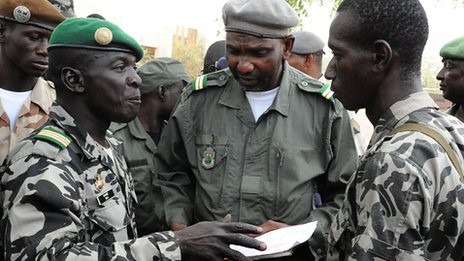
Soldiers in the West African state of Mali have staged a coup due to the failure of the Bamako government to handle a burgeoning rebellion in the north of the country. The coupmakers may be backed by the imperialist states led by the US., a photo by Pan-African News Wire File Photos on Flickr.
West Africa regional bloc suspends Mali after coup
BAMAKO, Mali
(AP) – The body representing nations in western Africa has suspended Mali and has put a peacekeeping force on standby in the most direct threat yet to the junta that seized control in a military coup last week.
Alassane Ouattara, the president of Ivory Coast who is the rotating chair of the Economic Community of West African States, or ECOWAS, told reporters after an emergency meeting in the capital of Ivory Coast that Mali's democracy cannot be abandoned. A delegation of five African presidents will head to Mali within the next 48 hours to try to "restore constitutional order."
There is no immediate plan to deploy the peacekeepers who will be put on standby in the event that a military intervention is needed, said Kadre Desire Ouedraogo, the president of the ECOWAS commission. The move suggests the bloc may consider force if the mutinous soldiers who overthrew Mali's democratically elected leader do not stand down.
"We cannot allow this country endowed with such precious democratic instruments, dating back at least two decades, to leave history by regressing. It's why Mali needs to immediately return its democratic institutions to normal," said Ouattara. "This position is nonnegotiable."
Already, the United States, the European Union and France have cut off all but essential aid, representing a loss of tens of millions of dollars. Additional sanctions from the region would be a further blow to the junta, which seized control of the nation of 15 million in the wake of a mutiny at a military camp in the capital last Wednesday.
In the chaos that ensued, soldiers stormed the presidential palace and drove into hiding President Amadou Toumani Toure, who was due to step down next month. In a matter of hours, they erased two decades of democratic rule.
Besides the threat of military intervention, Mali's neighbors could suffocate the nation financially. Many of the 15 nations represented on the regional bloc share the same currency, and they could together decide to cut off Mali's supply of cash. Also if nearby Ivory Coast were to shut its border, landlocked Mali, a nation twice the size of Texas spanning over an expanse of scrubland, verdant hills and desert dunes, would run out of gasoline, which is trucked in from Ivorian refineries.
The coup took the region and the world by surprise, because Mali has long been held up as one of the few established democracies in the troubled western corner of the continent. Late Tuesday on state television, the newscaster announced that Mali would soon be under a new constitution, indicating the putschists are moving forward with plans to create a new government, and not restoring the nation's democratic order.
The newsreader on state television, controlled by the junta, said that the military committee controlling the country "has just adopted the basic law regarding a new constitution for the Republic of Mali. The new basic law which will govern the state during the entire transition has 12 headings and 69 articles." The entire constitution will be read on state television later Tuesday.
The junta leaders are working hard to give the semblance of normalcy. In Bamako, the airport and the country's land borders reopened on Tuesday. The nighttime curfew was lifted. traffic was heavy, as offices reopened for the first time since the coup. The junta showed images on TV of looted goods being returned to their owners, after soldiers went on a pillaging spree, even stealing bananas from elderly women who eke out a living selling them on street corners.
"We want the soldiers back in their barracks," said Mohammed Decko, wearing a shirt with the image of ousted President Toure. "This coup is putting Mali back 20 years."
It was 21 years ago in 1991 that Toure ousted the country's military leader in a coup that came after months of protests. The former general, who once headed the country's parachute commandos, was dubbed "The Soldier of Democracy," after he handed power to civilians a year later, then retreated from public life. He remerged to win the 2002 and 2007 elections, and was due to retire at the end of his term next month.
Toure, whose whereabouts since the coup remain unknown, began losing support when an al-Qaeda-linked terror cell implanted itself in northern Mali starting in 2003. He is accused of turning a blind eye, while diplomatic cables suggest the government entered into a pact of nonaggression with the terrorists for fear they would strike the capital in revenge.
It was in January that Toure's popularity hit a new low, after a Tuareg uprising began in the country's north. Again Toure did not respond forcefully, and when he finally sent troops to fight the insurgents, they were ill-equipped. Some did not even have enough food.
The group of soldiers that led the attack last week said that it was Toure's failure and incompetence in dealing with the two-month-old insurgency that pushed them to seize power. Their leader is an army captain, who has been sent to the United States for military training. He speaks English and before the coup, he was an English language instructor at a military college.
No comments:
Post a Comment